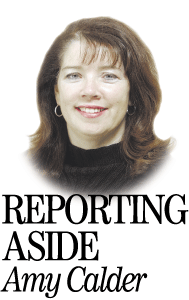The first thing you notice about Mary Nason is her beautiful hair. It shines in the sun and is an unusual shade of red.
Then you notice her professionalism, warmth and welcoming nature.
I met Nason on Thursday at the Waterville Social Club on Ticonic Street, where I dropped in unannounced.
I had never been there before and wanted to see what it was all about.
She introduced herself as a peer support specialist and offered to give me a tour of the club, which provides a safe, secure and supportive environment for people with mental illnesses, she said.
It is a very busy place, with members sitting at tables and socializing, playing pool and reading the newspaper. One man was working at a computer terminal, another was in a quiet room watching television. Others were working in the art room, where colorful paintings grace the walls.
The atmosphere is upbeat. People are talking and laughing in a way that makes me feel they know each other pretty well. I’m introduced to Natasha Mayers, the art teacher, who is anxious to tell me about an art show Saturday at Unity Performing Arts Center. It is a memorial show featuring the works of Ken Bryant, a longtime club member who died last year.
“His work is full of color — very imaginative,” Mayers says. “It is wonderfully self-revealing and intuitive.”
I am struck by the artwork all around me. It is fascinating and beautiful. Mayers says club members’ works are often shown in reputable museums and galleries because they are so unusual, fresh, direct and honest:
“In the summer of 2009, we had an art show in Camden and sold $12,000 worth of members’ art.”
Gary Stevens, a senior staffer at the club, works closely with Nason. They get along well. He quips that when members come in, they don’t ask for him — they want Mary.
“They connect with her,” sys Stevens, who used to work in law enforcement.
Nason relates well to members. She says that’s because she has a mental illness herself — bipolar disorder.
“Mental illness is not the end of the road,” she says. “It doesn’t have to be. You can still go and do what you want to do and reach the goals you have had all of your life. I am married and work and I have children, and I have a life outside of my illness.”
She says she was diagnosed at age 32 and now is 47. For several years, she struggled and eventually went back to get her college degree. In 2007, she saw an ad for a peer support specialist job at Riverview Psychiatric Center in Augusta.
“They were actually advertising for people with mental illness,” she said. “I had struggled in that ‘normal world,’ trying to find a place for my illness. I worked at Riverview a few months and it was a good experience. I knew that this is where I needed to be. It was my first experience of wholeness. I could bring my ‘crazy’ self to work. No matter how I felt, I could come and they’d accept me.”
A couple of years ago, she saw an opening for a peer support specialist at the Waterville Social Club, applied and got the job.
“Here I am,” she says. “I love it.”
Some club members are homeless. They sleep at the nearby homeless shelter and come to the club during the day.
Annie Roy, 66, live in the city’s south end, and has been a club member longer than anyone — since it opened in 1984.
“I have grown a lot by coming here and by being an active member,” Roy said.
Members make all the rules, decide what the menu is for the month — they get a meal each day at 4 p.m. — and organize fundraisers such as lawn and bake sales.
Roy said she especially loves the fishing and picnicking field trips. The state gives the club free fishing licenses and state park passes.
Funding for the club comes mostly from United Way, with a little help from the state, but the club operates on a thin budget that has been the same for 25 years, according to both Nason and Stevens.
I ask if they have a wish list. Stevens looks around the room, which is tidy, but has old tables and worn furniture.
“The van we have out there is on its last legs. And as you can see, we need new furniture and paint.”
The club is open 8 a.m. to 6 p.m. Monday through Thursday and 8 a.m. to 8 p.m. Friday.
“The only requirement is, you need to have a mental illness,” Stevens says. “We do not require documentation — just your good word.”
Amy Calder has been a Sentinel reporter 23 years. Her column appears here Saturdays. She may be reached at acalder@centralmaine.com
Send questions/comments to the editors.



Success. Please wait for the page to reload. If the page does not reload within 5 seconds, please refresh the page.
Enter your email and password to access comments.
Hi, to comment on stories you must . This profile is in addition to your subscription and website login.
Already have a commenting profile? .
Invalid username/password.
Please check your email to confirm and complete your registration.
Only subscribers are eligible to post comments. Please subscribe or login first for digital access. Here’s why.
Use the form below to reset your password. When you've submitted your account email, we will send an email with a reset code.